A trading card is a small card, usually made out of paperboard or thick paper, which usually contains an image of a certain person, place or thing and a short description of the picture, along with other text. When traded separately, they are known as singles. There is a wide variation of different types of cards.

A baseball card is a type of trading card relating to baseball, usually printed on cardboard, silk, or plastic. In the 1950s, they came with a stick of gum and a limited number of cards. These cards feature one or more baseball players, teams, stadiums, or celebrities.

Chewing gum is a soft, cohesive substance designed to be chewed without being swallowed. Modern chewing gum is composed of gum base, sweeteners, softeners/plasticizers, flavors, colors, and, typically, a hard or powdered polyol coating. Its texture is reminiscent of rubber because of the physical-chemical properties of its polymer, plasticizer, and resin components, which contribute to its elastic-plastic, sticky, chewy characteristics.

The Topps Company, Inc. is an American company that manufactures trading cards and other collectibles. Formerly based in New York City, Topps is best known as a leading producer of baseball and other sports and non-sports themed trading cards. Topps also produces cards under the brand names Allen & Ginter and Bowman.

Non-sport trading cards are a particular kind of collectible card designated as such because trading cards have historically prominently featured athletes from the world of sports as subjects. Non-sports cards are trading cards whose subjects can be virtually anything other than sports-themed.

Juicy Fruit is an American brand of chewing gum made by the Wrigley Company, a U.S. company that since 2008 has been a subsidiary of the privately held Mars, Incorporated. It was introduced in 1893, and in the 21st century the brand name is recognized by 99 percent of Americans, with total sales in 2002 of 153 million units.

The Wm. Wrigley Jr. Company, known as the Wrigley Company, is an American multinational candy and chewing gum company, based in the Global Innovation Center (GIC) in Goose Island, Chicago, Illinois.
Bazooka is an American brand of bubble gum that was introduced in 1947. It is a product of "Bazooka Candy Brands" (BCB), which was a division of The Topps Co. until the latter’s acquisition by Fanatics, Inc. in 2022.
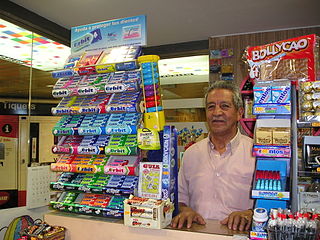
Orbit is a brand of sugarless chewing gum from the Wrigley Company. In the United States, where it was re-launched in 2001, it is sold in cardboard boxes with 14 individually wrapped pieces per package. In the UK, where it was launched in 1899 it was originally sold as a traditional long-stick gum, later replaced by the same format as the US.
The sale of chewing gum in Singapore has been illegal since 1992. Some motivations for the ban included stopping the placement of used chewing gum in inappropriate and costly places, such as the sensors of subway doors, inside lock cylinders, and on elevator buttons. Since 2004, an exception has existed for therapeutic, dental, and nicotine chewing gum, which can be bought from a doctor or registered pharmacist. It is not illegal to chew gum in Singapore, but it is against the law to import it and sell it, apart from the aforementioned exceptions. According to a BBC News article, it is legal for a traveler to bring in a small amount of chewing gum for personal use, and there is a fine for spitting the gum out in an inappropriate place.
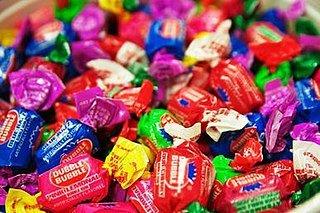
Dubble Bubble is an American brand of fruit-flavored, usually pink-colored, bubble gum invented by Walter Diemer, an accountant at Philadelphia-based Fleer Chewing Gum Company in 1928. One of Diemer's hobbies was concocting recipes for chewing gum based on the original Fleer ingredients. Though founder Frank H. Fleer had come up with his own bubble gum recipe under the name Blibber-Blubber in 1906, it was shelved due to its being too sticky and breaking apart too easily. It would be another 20 years until Diemer would use the original idea as inspiration for his invention.

Beemans gum is a chewing gum formulated by Ohio physician Edward E. Beeman in the late 19th century. It originally contained pepsin, but no longer does.
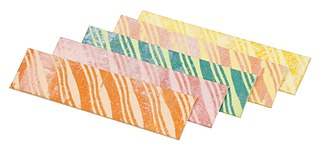
Fruit Stripe was an artificially and naturally flavored fruit chewing gum produced by Beech-Nut in 1960 and discontinued in 2024. The individual pieces of gum were striped and were packaged in zebra-striped wrappers, which also acted as temporary tattoos.
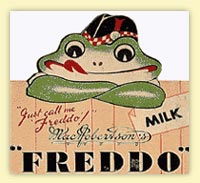
MacRobertson's, officially the MacRobertson's Steam Confectionery Works, was an Australian company that produced chocolates and various other confectionery. The company was founded in 1880 by Sir Macpherson Robertson and takes its name from a combination of his first and last name. The company was based for over 100 years in Fitzroy, Victoria, but later moved to Ringwood, Victoria. The company also became known for introducing chewing gum and fairy floss to Australia.
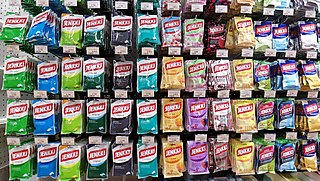
Jenkki ("Yankee") is a Finnish chewing gum brand developed in 1951 by Huhtamäki. Nowadays Jenkki is in ownership of Cloetta.

Stride is a brand of sugar-free chewing gum currently owned by Perfetti Van Melle, sold in packs of 14 pieces. It was introduced in May 2005. In 2019, Mondeléz International, the parent company of Stride gum, discontinued sales in the United States, Canada, and Europe to focus on other confections. It sold its chewing gum brands to Perfetti Van Melle in 2023.

The Gum Wall is a brick wall situated beneath Pike Place Market in Downtown Seattle, Washington (State), United States. Located on Post Alley near Pike Street, south of the market's main entrance off 1st Avenue, the wall is covered with used chewing gum. Certain sections of the gum accumulation on the walls measure several inches in thickness, reaching a height of 15 feet along a 50-foot-long segment. Originating inadvertently in the 1990s, the Market Theater Gum Wall has evolved into a notable tourist attraction and local landmark.

Chicle is a natural gum traditionally used in making chewing gum and other products. It is collected from several species of Mesoamerican trees in the genus Manilkara, including M. zapota, M. chicle, M. staminodella, and M. bidentata.

Michaela Ewuraba Boakye-Collinson, known professionally as Michaela Coel, is a British actress, filmmaker and poet. She is best known for creating and starring in the E4 sitcom Chewing Gum (2015–2017), for which she won the BAFTA Award for Best Female Comedy Performance; and the BBC One/HBO comedy-drama series I May Destroy You (2020) for which she won the British Academy Television Award for Best Actress in 2021. For her work on I May Destroy You, Coel was the first black woman to win the Emmy Award for Outstanding Writing for a Limited Series, Movie, or Dramatic Special at the 73rd Primetime Emmy Awards.
Chewing Gum is a British television sitcom created and written by Michaela Coel, based on her 2012 play Chewing Gum Dreams. It stars Coel as 24-year-old shop assistant Tracey Gordon, a restricted, religious virgin, who wants to have sex and learn more about the world. The show earned Coel the BAFTA for Best Female Performance in a Comedy Programme and Breakthrough Talent.
















